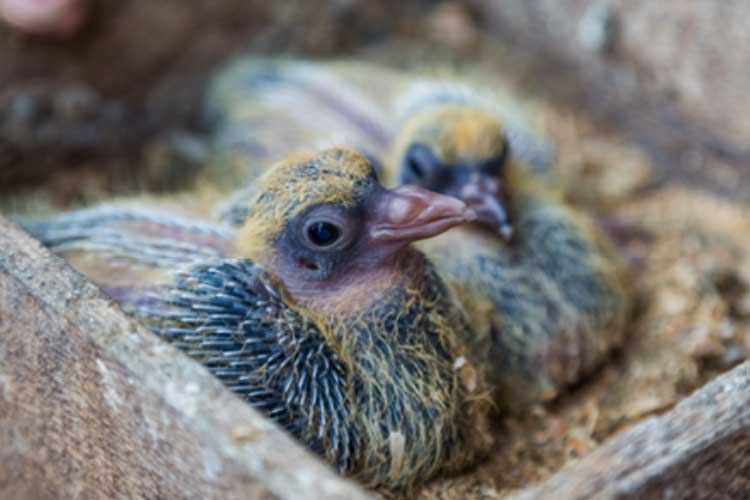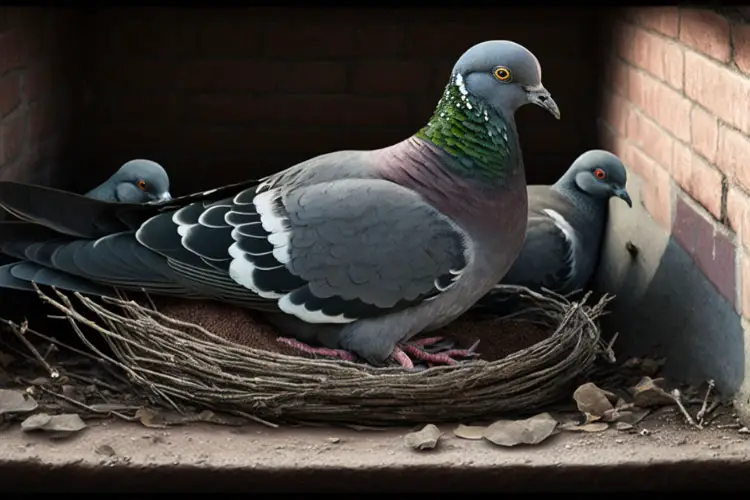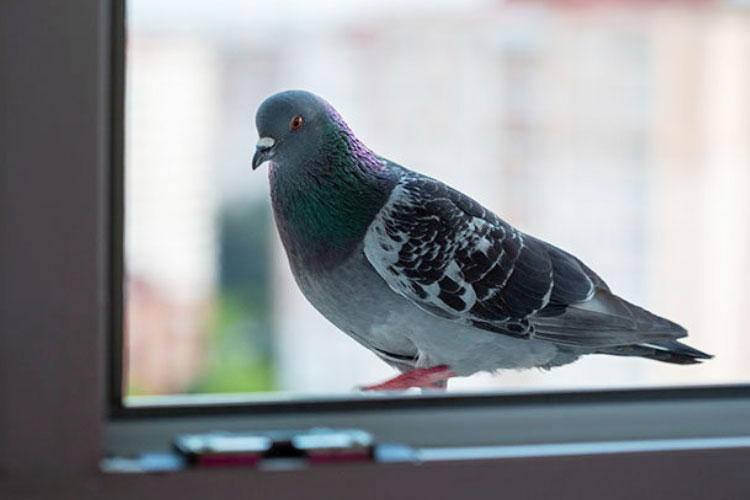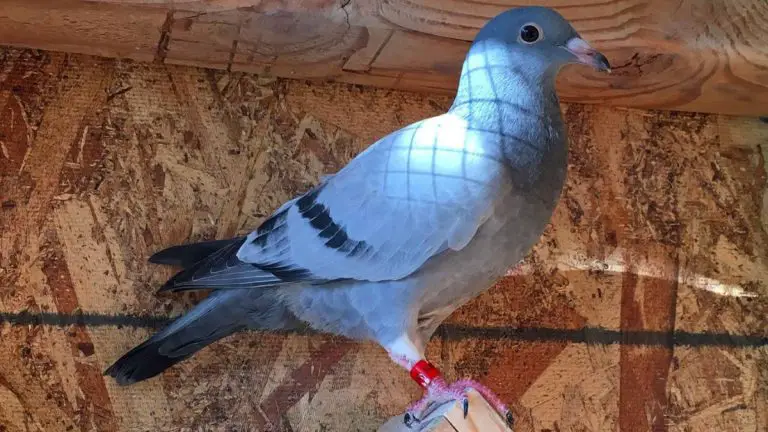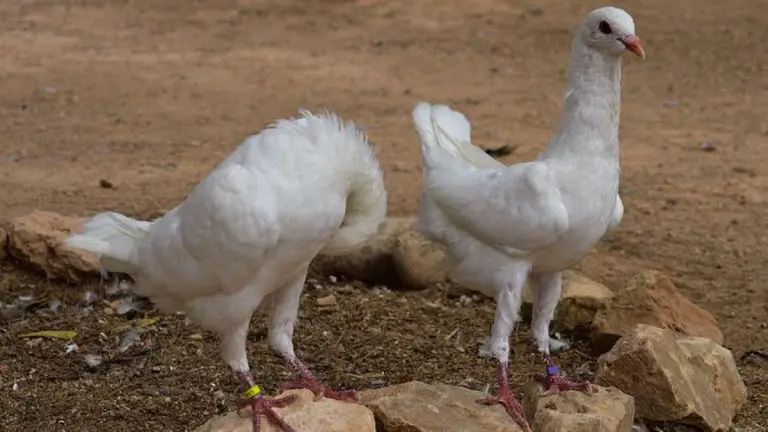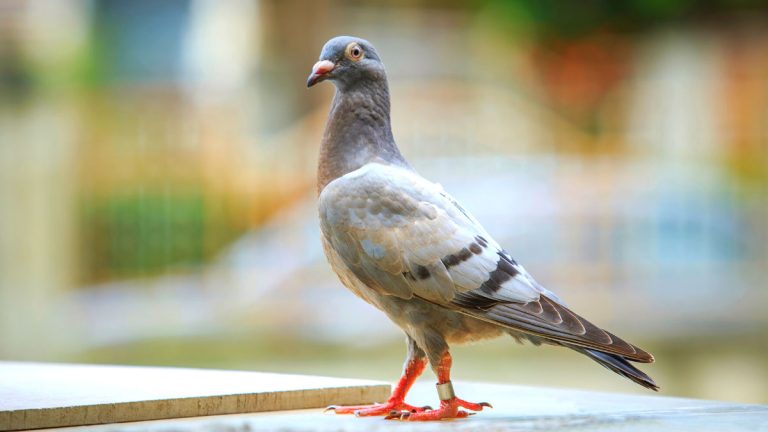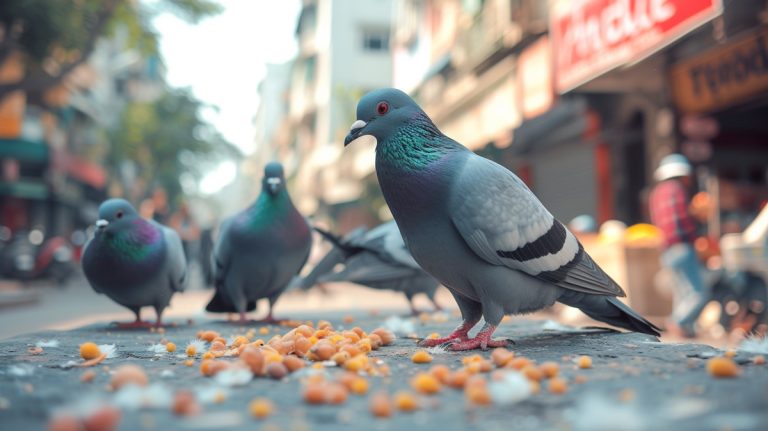How To Take Care Of A Baby Pigeon? Do It the Right Way
More than 350 different breeds of pigeons exist today, and breeding them has evolved into a widespread hobby globally. But taking care of baby pigeons is not as easy as petting a mature one. It requires proper guidelines and knowledge to take care of squabs.
So how to take care of a baby pigeon? The first thing to understand is the physiology and psychology of the squab. Then ensuring proper warmth, hand-feeding them properly, and regularly substituting crop milk, giving them a good habitat. Also, looking for any illness is all part of the process.
It can become an exciting adventure or a huge failure based on your skills. Keep reading to get good enlightenment.
Basic Info About Baby Pigeons
Usual time of a baby pigeon’s hatching is somewhere around three weeks. Although pigeons are known to be great parents, there are exceptions.
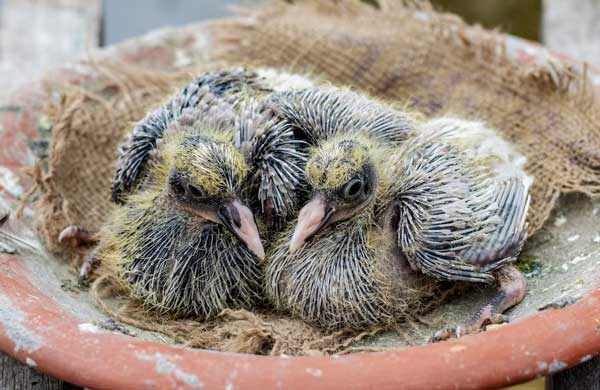
Hence, it’s important to understand the physiology of the baby in case you have decided to rear it yourself. Here’s a table with some of the basic information about baby pigeons
| Aspects | Changes according to age |
| Common Name | Squabs |
| Differences with Age | 1 day: closed eyes, visible skin color with very little hair |
| 5 days: opens eyes for the first time, hair amount increases | |
| 8 days: feathers start to grow | |
| 12 days: feathers get more clear color, and it begins to walk | |
| 14 days: feathers get more dense color | |
| 19 days: size increases but the face remains yellow | |
| 22 days: whole body and face get fully colored | |
| 30 days: almost prepared but unable to fly | |
| 45 days: not a baby anymore and gets to fly |
Table 1: Physiology of baby pigeons
Naturally, babies can stay in the nest for 45 days and the above table shows you the changes you will notice in them. Till then, it’s your responsibility to rear these feathery hatchlings.
Likewise, newly hatched ones weigh about 15 grams. This can go up to 350 grams for a month-old chick. The hatching of a pigeon is a tiring process. So, you will have to give the hatchling at least half a day before going into any other actions.
However, if the hatchling seems to be in discomfort right from the word go, don’t waste any time in taking it to a vet.
How To Take Care Of A Baby Pigeon?
In this segment of this article, I will discuss everything you need to know related to baby pigeon care.
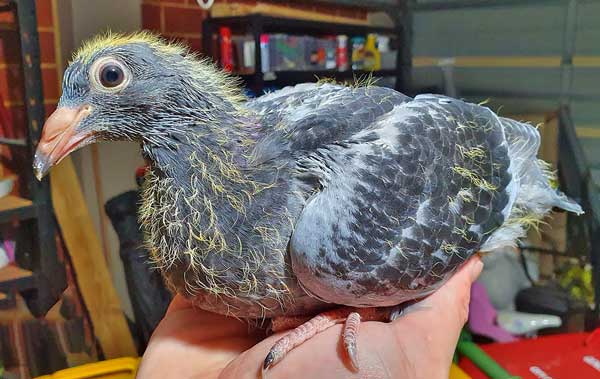
Heat
The parents usually do the heating process necessary for the baby pigeons. However, if you have decided to take care of the hatchlings, you need to ensure the heating manually.
In that case, you will need a heating pad specially made for baby pigeons and put it on a low setting to give proper warmth to the babies. This is very important and should be maintained for at least a month.
Other alternatives you can use to work as a heating component are
- A 40-watt bulb
- Water bottle full of hot water and wrapped by a cloth
If the season is winter, this is even more necessary. During summer, the outside heat can work as a source sometimes. Nevertheless, don’t directly expose the babies to a heating source or put them near one. Always consider a box setup.
On the other hand, their digestion requires heat. Furthermore, the baby pigeon is very susceptible to temperature changes in the early days and can’t tolerate excessive fluctuations.
However, you should relax a bit after the hatchlings start to grow feathers as the temperature tolerance increases.
Diet of Baby Pigeons
This is probably the most important aspect of taking care of a baby pigeon. However, you can’t feed the baby anything for half a day after hatching. Afterward, you will have to feed it every 2 hours.
Moreover, if the squab isn’t at the right temperature, feeding could eventually kill it. The food temperature is also very important in this scenario and the best temperature is 102.2o F. Don’t microwave foods.
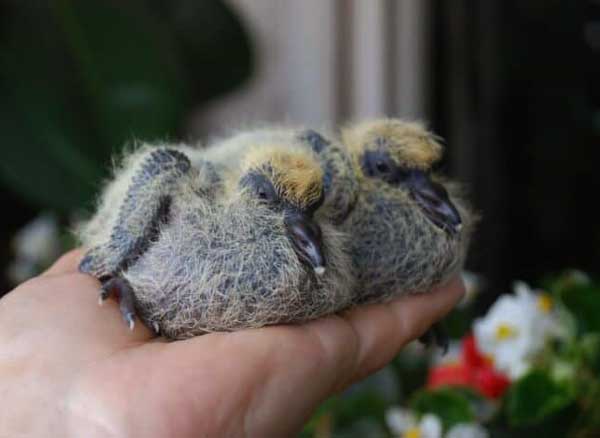
The best food for baby pigeons is crop milk, a slightly digested liquid substance that the parent pigeons put in the baby’s mouth from their mouth.
Overall, no matter what you feed your squabs, it has to reach the quality of the crop milk to ensure better health for your baby pigeon. Hence, I will now divide this segment into the following parts
What to Feed And What Not To Feed?
Here are some of the best options to consider while feeding your baby pigeon
- Ready-made formula
- Home-made options
Ready-made formulas such as Kay tee formula are available in pet shops and these are fantastic foods for the baby pigeon. You will need to mix warm water and mix it properly until it becomes thick like honey.
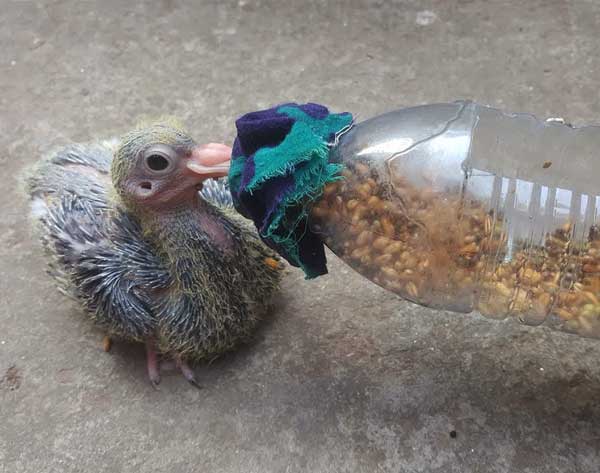
Afterward, you can feed your squabs with a syringe, but never overfeed. After 15 days or so, you can mix egg yolk to it to increase the protein intake. Besides, don’t forget to check the instructions on the pack.
Homemade options can also be good enough to serve the nutrition needs of a baby pigeon. Some of them include
- Oatmeal
- Finely chopped soft fruits and vegetables along with crumbs
- Homemade recipes
Don’t give milk directly to your bird, rather mix it with other ingredients and then serve. Moreover, don’t even think about giving worms to baby pigeons.
Here’s a video of a homemade recipe you can give to your baby pigeon
When to Feed?
Here’s a table that will help you understand when you should feed your baby bird and what kind of changes you should bring to the diet
| Days | Food Items | Frequency |
| 1-3 days | Ready-made formula or egg yolk | Four times daily |
| 3-14 days | Mixture of egg yolk and formula or finely chopped soft fruits and veggies | Thrice or four times daily |
| 14-21 days | Ready made formula or a mixture made of wild bird seeds | Thrice daily |
| 21+ days | Seed mixture along with fruits and veggies | Twice daily |
Table 2: Food-serving cycle of baby pigeons
How to Feed?
It’s the best option for someone who is planning to hand-feed a baby pigeon to try and replicate the way pigeon parents feed their babies. It’s done by the baby putting the beak inside the parent’s beak, which helps them to take the crop milk easily.
Your best option to mimic this is by using a plastic syringe. Put food inside it and gently try to feed your squab with its help. Always look for stress signs. If the bird is stressed, immediately stop feeding.
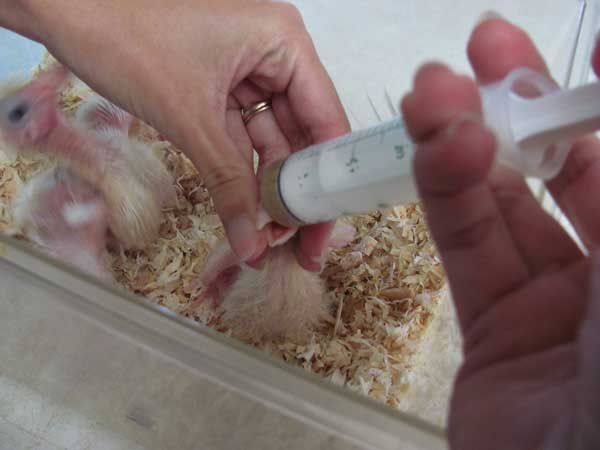
To know the amount your squab needs to consume, check its crop. It’s an organ between the throat and the gut. If the crop feels like a three-forth filled balloon, then that’s enough feeding.
Similarly, when this part is totally plain, then it’s time to feed the pigeon. This can take up to a day, sometimes based on the age of the bird.
Habitat
You can use a box or any type of vessel that’s open and not deep to place your baby birds. Of course, it should have enough ventilation facilities.
In this regard, mimicking the natural nest can be an option that can be done by placing a cloth or towel on a round basket-type setting. Of course, the base of the home should be strong to give the pigeons solid feet.
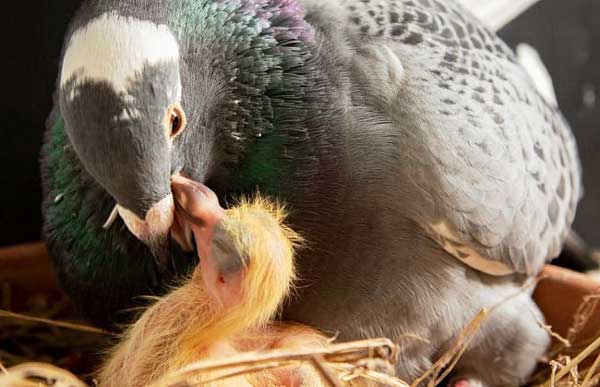
Never put anything in the house that can be eaten by the pigeon, like sand or any small stick. Put it in a safe place to avoid any predators from approaching.
What Are The Signs of An Extremely Sick Baby Pigeon?
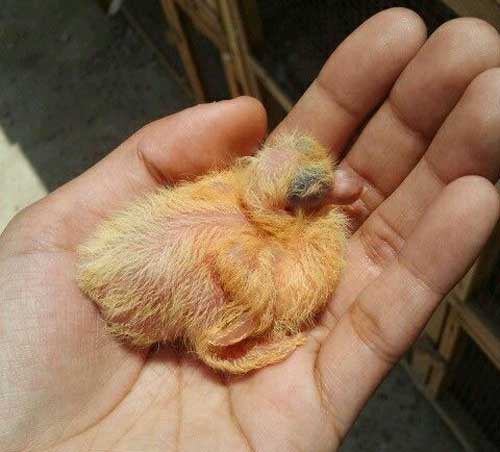
Here are some of the concerning signs that can indicate your baby bird might not survive
- Apathy
- Unwilling to eat or drink
- Irritated eyes
- Inflated feathers
- Change in body color
- Can’t breathe properly
- Damp body
- Wet stool
- Static
- A sideways head
If you see any of these signs, immediately take your bird to a vet.
As a pigeon owner, you want to make sure that your birds stay healthy and safe. But have you ever wondered about their natural predators? Our articles on whether eagles eat pigeons and whether pigeons eat from bird feeders might provide some insights. The article on eagles eating pigeons talks about how these majestic birds of prey can pose a threat to your pigeon’s safety. And if you’re curious about whether pigeons will eat from bird feeders, our article on pigeon feeding habits has got you covered. So if you want to learn more about your pigeons’ natural habits and behaviors, be sure to check out these informative articles.FAQs
Let’s look at some of the frequently asked questions and their answers related to caring for a baby pigeon.
Ans. Yes, they do need water for growth. Hence, always give them water in a small pot or feed them with a syringe.
Ans. Yes, they do need sunlight for vitamin D and other feathers or health-related and hormonal well-being.
Ans. Yes, baby pigeons grow fast. It only takes about 4 to 6 weeks for them to be able to fly away from your care.
Final Thoughts
Watching your own hand-grown and hand-fed baby pigeon turn into an adult and fly in the sky is a heavenly feeling indeed. However, intense caring for 45 days is a prerequisite to getting this feeling.
Hopefully, today’s article will guide you in every aspect regarding the care of a baby pigeon. Don’t take any decision without proper knowledge of this matter. Moreover, you can always get back to this article for further reference.
